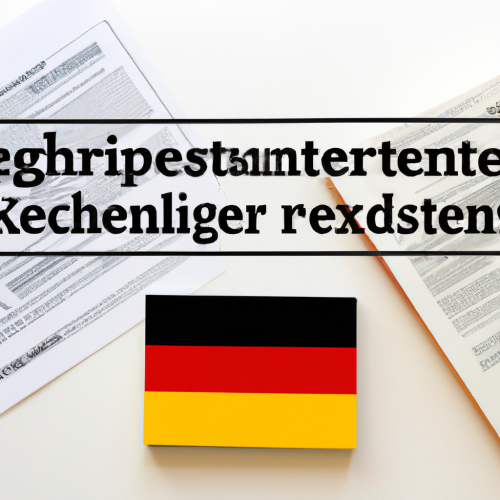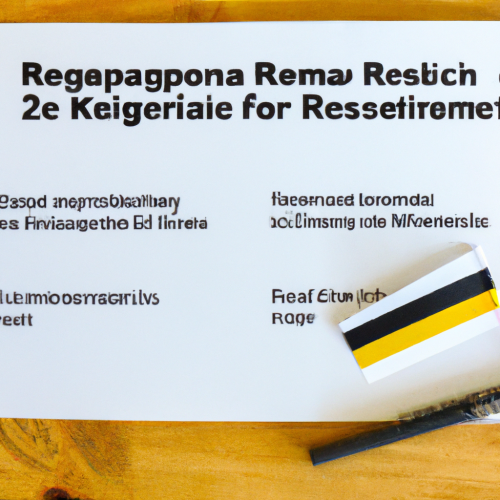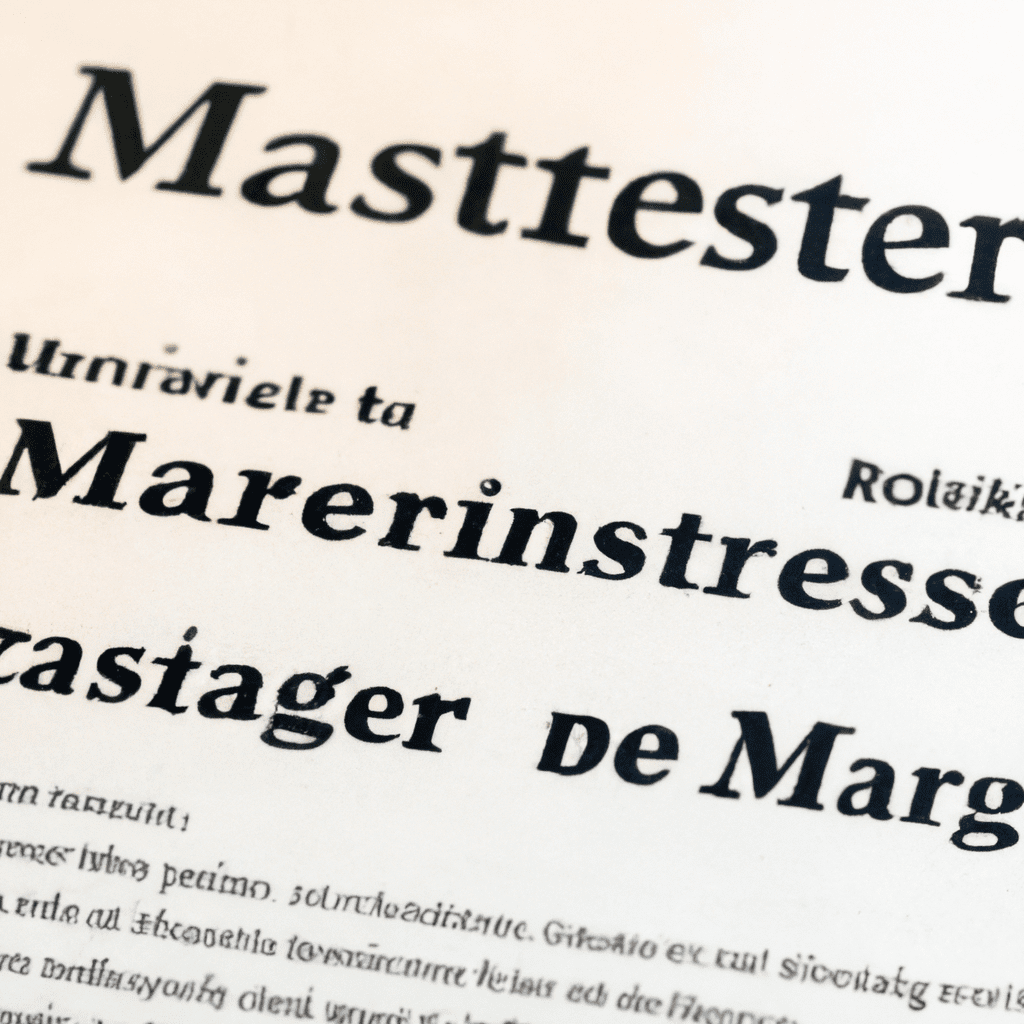Are you considering relocating to Germany but unsure about the residency process? Look no further. This comprehensive guide aims to unravel the intricacies and help you master the German residency requirements. Whether you have plans to work, study, or settle down in this vibrant European country, understanding the necessary steps and regulations is essential. From visa applications to registration procedures, we will provide you with a detailed roadmap to navigate the path towards obtaining German residency. Let us assist you in demystifying the bureaucratic labyrinth and set you on the right track to seamlessly establish yourself in Germany.
1. Understanding the German Residency Process: An In-depth Overview
Germany is known for its rich history, vibrant culture, and thriving economy, making it a sought-after destination for many individuals wishing to establish residency in the country. If you’re planning to make Germany your new home, it’s essential to have a comprehensive understanding of the German residency process. This in-depth overview will guide you through the necessary steps and requirements to ensure a smooth transition.
1. Types of German Residency Permits
Before diving into the process, let’s familiarize ourselves with the various types of residency permits available in Germany:
- Temporary Residence Permit (Aufenthaltstitel): Designed for individuals planning to stay in Germany for a specific period, such as study, work, or family reunion.
- Permanent Residence Permit (Niederlassungserlaubnis): Offers long-term residence to individuals who have fulfilled specific requirements and have been residing in Germany for a considerable period.
2. Required Documents and Application Process
To apply for a German residency permit, you will typically need to provide the following documents:
- Valid passport and copies of all passport pages
- Proof of sufficient financial means to support yourself
- Health insurance coverage
- Proof of a valid reason for residency, such as employment contract or university enrollment
The application process involves submitting your documents to the relevant German embassy or consulate in your home country. Once your application is approved, you’ll be granted a residency permit, allowing you to legally reside in Germany.
3. Extending or Changing Residency Status
If your circumstances change or you wish to extend your stay in Germany, you’ll need to consider the following options:
- Extensions: If you still meet the requirements for your current residency permit, you can apply for an extension before it expires.
- Changing Status: If your purpose of residency changes, for example, from studying to working, you’ll need to apply for a new permit that aligns with your updated situation.
Remember to keep track of your residency permit’s validity and plan ahead to ensure a smooth transition if you need to extend or change your status.

2. Requirements for Obtaining German Residency: Step-by-Step Breakdown
The process of obtaining German residency can be complex, but with a step-by-step breakdown, it becomes more manageable. To successfully navigate through the requirements, it is crucial to follow the following steps:
Step 1: Research the Different Types of Residence Permits
- Familiarize yourself with the various residence permits available in Germany. Common types include student visas, work permits, and family reunion visas.
- Identify the specific permit that suits your situation and purpose for residing in Germany.
Step 2: Gather the Required Documents
- Compile the necessary documents for your chosen residence permit. These typically include a valid passport, proof of health insurance, financial documents, and a completed visa application form.
- Ensure that all the documents are up to date and meet the German authorities’ requirements.
Step 3: Make an Appointment at the German Embassy or Consulate
- Contact the German embassy or consulate in your home country to schedule an appointment.
- Submit your application and necessary documents during the appointment. This is also an opportunity to ask any questions you may have regarding the process.
Step 4: Attend the Required Appointments and Interviews
- Depending on your chosen residence permit, you may be required to attend additional interviews, language proficiency tests, or medical examinations.
- Ensure you are well prepared and punctual for each appointment, as they are crucial for the success of your residency application.
By following these step-by-step guidelines, you will have a clearer understanding of the requirements for obtaining German residency. Remember to stay organized, gather all necessary documents, and seek the advice of professionals or relevant authorities whenever needed. Good luck with your journey towards residency in Germany!
3. Navigating German Immigration Authorities: Tips and Insights
When it comes to navigating German immigration authorities, having some helpful tips and insights can make the process much smoother. Whether you are planning to work, study, or settle in Germany, understanding the intricacies of the immigration system is essential. Here are a few key points to keep in mind:
- Documentation is key: Make sure you have all the necessary documents before approaching the immigration authorities. This includes your passport, visa application, proof of financial means, and any other supporting documents specific to your purpose of stay.
- Stay up to date with regulations: German immigration laws and regulations can change frequently, so it’s important to stay informed. Keep track of any updates or changes that may affect your immigration process by regularly checking the official websites or seeking advice from reputable immigration professionals.
- Language proficiency matters: While it’s not mandatory for all visa types, having a basic understanding of the German language can greatly facilitate your interaction with the authorities. Consider enrolling in language courses to improve your language skills and demonstrate your commitment to integrating into German society.
It’s also worth mentioning that each immigration authority might have its own processes and requirements, so it’s crucial to do thorough research and gather as much information as possible. Remember to be patient throughout the process, as it can sometimes be time-consuming and involve multiple steps. Seeking assistance from immigration lawyers or consultants who specialize in German immigration can provide valuable guidance and ensure that you have the best chance of success.
4. Tips for Finding Suitable Accommodation in Germany: A Comprehensive Guide
When it comes to finding suitable accommodation in Germany, there are a few key tips to keep in mind. Whether you’re a student, professional, or simply relocating, finding the right place to live is crucial for a smooth transition. Here are some guidelines to help you navigate the German housing market:
- Start early: The German rental market can be competitive, so it’s important to start your search as early as possible. Begin looking at least a few months in advance to increase your chances of finding the perfect place.
- Research the area: Before committing to a specific location, do thorough research on the neighborhood. Factors such as safety, proximity to amenities, and transportation links should all be considered to ensure a convenient and comfortable living experience.
- Consider budget: Determine a realistic budget for your accommodation. Keep in mind that Germany has a wide range of rental prices depending on the city and location. While large cities like Munich and Berlin tend to be more expensive, smaller towns often offer more affordable options.
- Explore different options: Apart from traditional apartments, Germany offers a variety of housing options such as shared flats (WG), student residences, and serviced apartments. Research and evaluate these alternatives to find the one that suits your needs and preferences the best.
By following these tips, you’ll be well-equipped to find suitable accommodation in Germany. Remember to thoroughly understand your requirements, stay organized, and be proactive in your search. With a little patience and determination, you’ll soon find your ideal home base in this wonderful country.
5. Integrating into German Society: Recommendations for Building a Strong Foundation
Integrating into a new society can be an exciting but also challenging experience. Germany is known for its rich history, diverse culture, and strong sense of community. To help you build a strong foundation and smoothly integrate into German society, here are some recommendations:
1. Learn the Language:
Mastering the German language is crucial for successful integration. Consider enrolling in language courses or hiring a tutor to accelerate your learning process. Additionally, immerse yourself in the language by watching German movies, listening to local radio stations, and practicing conversations with native speakers. Fluency in German will open doors to better employment opportunities and enable you to engage with Germans on a deeper level.
2. Understand German Customs and Etiquette:
German society values punctuality, respect for personal space, and maintaining a structured lifestyle. Familiarize yourself with these customs and follow them to integrate smoothly. Germans appreciate directness and honesty in communication while maintaining a level of politeness. It is also essential to respect their recycling culture and adhere to the specific waste separation rules practiced in your locality.
3. Participate in Social Activities:
Getting involved in social activities will allow you to build a strong network, make friends, and experience German culture firsthand. Join local clubs, sports teams, or volunteer organizations to meet like-minded individuals and immerse yourself in the community. This will not only help you overcome cultural barriers, but also provide valuable insights into local traditions and values.
Remember, successful integration takes time and effort. Embrace the challenges, remain open-minded, and be willing to adapt to the uniqueness of German society. By following these recommendations, you will lay a strong foundation for your new life in Germany.
6. Maximizing Your German Residency: Exploring Long-term Benefits and Opportunities
As you settle into your life in Germany, it’s important to understand the plethora of long-term benefits and opportunities that come with being a resident. This section explores some key aspects you can leverage to make the most out of your German residency.
1. The German Education System
The German education system is renowned for its quality and accessibility. As a resident, you and your family have access to excellent schools and universities, both public and private. Take advantage of this by enrolling yourself or your children in German educational institutions. Not only will this provide you with a world-class education, but it will also enhance your language skills and cultural integration.
2. Health Insurance and Healthcare
Germany’s healthcare system is one of the best in the world, and as a resident, you can benefit from comprehensive health insurance coverage. Ensure that you register with a healthcare provider and understand the services available to you, such as regular check-ups, preventive care, and specialist consultations. By prioritizing your health and well-being, you can make the most of the excellent medical facilities in Germany.
3. Career Development and Job Opportunities
Germany has a thriving job market, providing numerous opportunities for career development and growth. Take advantage of this by actively networking, attending industry events, and exploring job boards specific to Germany. Additionally, consider learning the German language to greatly enhance your chances of finding employment or advancing in your current career. Germany’s stable economy and wide range of industries offer a promising environment for professional success.
By maximizing the long-term benefits and opportunities that come with your German residency, you can ensure a fulfilling and prosperous life in this vibrant country.
In Conclusion
In conclusion, mastering the German residency process can be a complex and intimidating endeavor for many individuals. However, with the right information and guidance, it can become a manageable and even rewarding experience. This detailed guide has highlighted the key steps, requirements, and potential challenges one may encounter along the way.
By understanding the various residency options available and the corresponding eligibility criteria, you can make informed decisions about the most suitable route for your individual circumstances. Familiarizing yourself with the necessary documentation and application procedures will also help to streamline the process and increase your chances of success.
It is important to note that while this guide provides a comprehensive overview, individual circumstances may vary, and specific requirements may change over time. Therefore, it is advised to consult with relevant authorities, such as the German Federal Foreign Office or local immigration offices, for the most up-to-date and accurate information.
Additionally, tackling language barriers and cultural integration should not be underestimated. Making an effort to learn the German language, understanding local customs, and connecting with local communities can greatly enhance your experience and integration into German society.
Remember, obtaining German residency is not merely a bureaucratic process but a significant step towards building a new life in this vibrant country. It may take time, patience, and thorough preparation, but with determination and perseverance, you can successfully navigate the intricate pathways of German residency.
Ultimately, this guide serves as a valuable starting point in your journey towards mastering the German residency process. Arm yourself with knowledge, seek the appropriate support, and stay motivated; your goal of becoming a resident in Germany is within your reach. Good luck on your path to securing a new life in this thriving nation.





